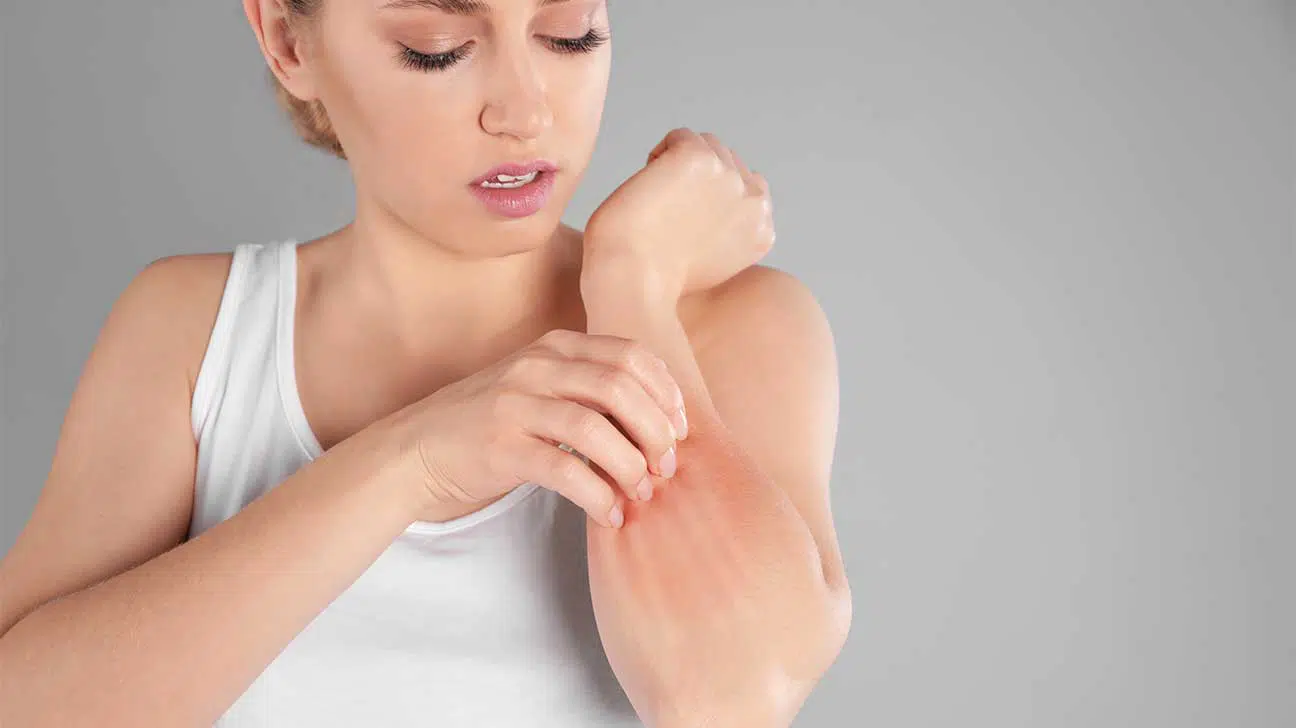
Quitting alcohol after a period of chronic, heavy drinking may cause a number of symptoms of alcohol withdrawal syndrome, including effects on the skin.
Because excessive alcohol consumption can affect the skin, as well as other organs associated with skin conditions, getting sober may also cause certain side effects.
Here you’ll find information on effects of alcohol on the skin, how alcohol detox affects the skin, and for how long effects on the skin from alcohol detoxification lasts.
What Happens To Your Skin When You Stop Drinking?
Alcohol consumption is associated with a number of effects on the skin, including skin dryness, redness, alcohol-induced premature aging, inflammation, and acne.
When you stop drinking, some of these effects may go away. However, in some cases, skin conditions may get worse before they get better. This can be a sign of healing.
During the detox process, the body will begin to recover from the effects of heavy drinking. However, you may still notice some side effects on skin, such as itchiness, clamminess, and dryness.
Clammy Skin And Alcohol Detox
Alcohol withdrawal affects the central nervous system, which helps to regulate functions such as body temperature, blood pressure, and heart rate.
Clammy skin, as well as hot and cold flashes, are common symptoms of alcohol withdrawal that may begin to occur within six to 24 hours after your last drink.
Dry Skin And Alcohol Detox
Alcohol is known to dehydrate the skin. For people with a history of heavy drinking, this dehydration and dryness may last for several days after you’ve stopped drinking.
It can take the skin some time to readjust to the lack of alcohol in your system and for it to begin healing from the effects of heavy alcohol consumption.
Itchy Skin And Alcohol Detox
Itchy skin, also known as pruritus, is not a commonly discussed symptom of alcohol withdrawal, but it can occur—especially if you’re malnourished or have another underlying illness.
Factors that can contribute to itchy skin during alcohol detox include:
- zinc deficiency
- anemia
- opioid dependence
- liver and kidney disease
- psychiatric conditions (e.g. anxiety)
- thyroid problems
- nerve disorders
- other skin conditions (e.g. eczema)
If you feel extremely itchy, or have a sense that there are invisible bugs crawling on your skin, this can also be a sign of severe alcohol withdrawal, or delirium tremens (DTs).
What Factors Can Influence The Effects Of Alcohol Detox On Skin?
Side effects of alcohol detox and acute withdrawal can be influenced by a number of factors related to your substance use, overall health, and underlying health conditions.
Factors that can influence effects on skin include:
- amount of alcohol consumed
- duration of heavy drinking
- liver and kidney function
- certain medical conditions (e.g. diabetes, anemia)
- use of other drugs (e.g. opiates, benzodiazepines)
- nutritional status
- co-occurring mental health conditions
Other personal factors such as age and genetics can also play a role in physical symptoms of alcohol detox and the body’s process of healing in early sobriety.
Nutritional Deficiencies And Alcohol Detox Effects On Skin
Another key player in skin health that is relevant to alcohol detox is the body’s nutrients and nutrient deficiencies that can develop as a result of alcohol abuse and addiction.
Malnutrition related to alcohol abuse may affect:
- skin complexion
- skin structure
- sensations like itchiness
- dryness of skin
- flakiness
During alcohol detox and into early recovery, taking vitamin and mineral supplements, as well as eating a balanced diet, may help to counteract some of these effects.
Alcohol Detox Effects On Skin FAQs
Find answers to frequently asked questions about the effects of alcohol detox on your skin.
How Long After Quitting Drinking Does Your Skin Improve?
The amount of time it takes to see improvement in your complexion and overall skin health can vary depending on the duration of alcohol abuse and other factors.
For some, skin conditions may see some improvement within as little as one week. Eating a nutrient-rich diet and taking vitamin supplements as needed may help with this.
Can Alcohol Skin Damage Be Reversed?
Some damaging effects of alcohol on the skin, such as blotchiness and dryness, may improve with time, a nutritious diet, and alcohol addiction treatment.
Whether skin damage is reversible will depend on the type of skin damage, overall health, and other personal factors that can be discussed with a healthcare provider.
Where Can You Get Help For Alcohol Detox?
The best way to detox from alcohol is to enter an inpatient detox facility or addiction treatment center for medical detox. This can offer 24-hour supervision and medical treatment.
Alcohol detox programs may also be offered by some outpatient treatment providers, although this is not recommended for people with severe alcohol dependence.
Find Alcohol And Drug Addiction Treatment Today
If you or a loved one are looking for substance abuse treatment, help is available. Reach out to AddictionResource.net today for more information.
Addiction Resource aims to provide only the most current, accurate information in regards to addiction and addiction treatment, which means we only reference the most credible sources available.
These include peer-reviewed journals, government entities and academic institutions, and leaders in addiction healthcare and advocacy. Learn more about how we safeguard our content by viewing our editorial policy.
- Insider — What Happens to Your Skin When You Stop Drinking Alcohol
https://www.insider.com/stop-drinking-what-happens-to-your-skin-2018-8 - Mayo Clinic — Itchy skin (pruritus)
https://www.mayoclinic.org/diseases-conditions/itchy-skin/symptoms-causes/syc-20355006 - Oregon State University Linus Pauling Institute — Skin Health
https://lpi.oregonstate.edu/mic/health-disease/skin-health - Substance Abuse and Mental Health Services Administration (SAMHSA) — TIP 45 Detoxification and Substance Abuse Treatment
http://store.samhsa.gov/product/TIP-45-Detoxification-and-Substance-Abuse-Treatment/SMA15-4131 - U.S. National Institute on Alcohol Abuse and Alcoholism — Alcohol and Nutrition - Alcohol Alert No. 22- 1993
https://pubs.niaaa.nih.gov/publications/aa22.htm - U.S. National Library of Medicine: MedlinePlus — Alcohol withdrawal
https://medlineplus.gov/ency/article/000764.htm


